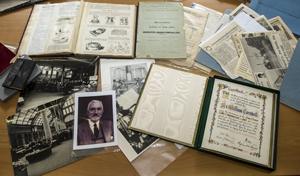WHAT MATERIAL DO YOU ACCEPT?
The archive collects historical and contemporary material on mills and milling, including millwrighting and the place of the mill in social as well as technological and architectural history.
The material we collect includes photographs, printed material (such as books, journals, reports, postcards), documents (such as correspondence, field notes, drawings, plans), digital files, small artefacts, artwork and ephemera of milling relevance.
Priorities
Our collecting priorities include:
- Mills/regions under-represented in our archive catalogue
- Watermills
- Mills outside of England
- The history of the roller flour milling industry
- Electricity generation/green energy
- Early windmill collections e.g. 1940s and before
- Millwrighting drawings
- Detailed reports and surveys
Where collections do not fall into these areas we may choose not to accept them. If you are able to give us an indication of what the material consists of, such as lists, photographs or scans of items, this will help us decide.
Books
We have a large and growing library and welcome donations, particularly of rare and unusual volumes. If you provide us with a list of titles or simply take photographs of the books on the shelves (ensuring the titles are legible), we will be able to indicate which we would be interested in.
Looking after your records
Delivery, packing, preservation and storage of archival collections all incurs costs. As a charity we rely on donations from the public to enable us to look after our records. Any contribution you are able to make will be very gratefully received and will help ensure the long term future of your collection.
WHAT WILL YOU DO WITH MY DONATED MATERIAL?

Books, journals and other printed items will be catalogued as part of our library. All other material will be sorted, listed, catalogued as a collection on our Archive catalogue and stored in archival packaging. We try to make material available to researchers as soon as possible; we can however restrict access to material for a specific time period if you require it.
Where there are items we do not wish to keep (usually duplicates of printed material already in our library) we will dispose of these, where possible by sale to raise funds for the archive.
If you prefer we can arrange to return all such material to you. In some cases material may be transferred to other archive repositories if it is thought that they will provide a better home. Your permission will be sought before this is carried out.
WHAT INFORMATION SHOULD ACCOMPANY A DONATION?
When receiving material we need to establish:
Ownership
Only material belonging to you can be given to the Archive. A deed of gift will need to be signed transferring ownership to the Mills Archive.
Copyright
Material may be given to us regardless of who holds the copyright, as long as it belongs to you. However, we will not have as much freedom in providing access to material if we do not have copyright permission to reproduce it. You can help us by doing the following:
- Letting us know which items you hold the copyright to, and if possible the identity of the copyright holder for the rest.
- Providing copyright permission for the material to which you hold the copyright. We prefer the copyright to be transferred to us outright, but are also happy to accept a copyright licence allowing us to make normal archival use of material – publication on the internet and the provision of copies for research and private study (for which a small charge may be made). We are prepared to consider other copyright arrangements depending on your wishes.
Ownership and copyright are covered by our acquisition form, which we will require you to sign – although an exchange of emails may be sufficient if all the points are covered clearly.
Origins
We are also keen to know as much about the material as possible (such as dates, names of photographers for photos, etc.) Any lists, catalogues or descriptions of the material you can provide will be very welcome. Lists in spreadsheet form, with a single line for each item, are particularly helpful. Biographical details of the collector are also useful.
HOW SHOULD MATERIAL BE PREPARED FOR TRANSFER?
Physical material
The more organised material is when received, the more easily we can process it – where possible, therefore, please label boxes or folders with descriptions of their contents. Avoid writing on items (except in soft pencil, such as 2B) and do not stick labels to original items (such as books and photographs) but confine them to storage containers (such as folders, boxes). We can provide suitable labels.
Digital material
It will help us if this is in the following formats:
- Scanned images should be saved as uncompressed TIFF images – these should be as large as possible, at least 2400 pixels wide on the shorter side. For all but the largest documents this means scanning at 600 dpi or greater. Scanning resolutions should be 600, 1200 or 2400 dpi (the latter for 35mm slides); colour depth 24 bits or better (or 8 bits for monochrome material). File sizes tend to be 5-25 MB each, but can be much bigger for larger documents.
- Digital photographs should be as high resolution as possible.
WHERE SHOULD I SEND MATERIAL?
If you have material you would like to send, please contact us first. If we decide that we would like to accept the material, please send it to our Reading address. We may be able to help with transport.
